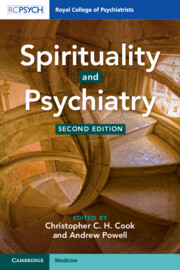Book contents
- Spirituality and Psychiatry
- Spirituality and Psychiatry
- Copyright page
- Contents
- Figures
- Tables
- Boxes
- Contributors
- Foreword to the Second Edition
- Foreword to the First Edition
- Preface to the Second Edition
- Preface to the First Edition
- Acknowledgements
- The Spirituality and Psychiatry Special Interest Group of the Royal College of Psychiatrists: A Personal Reflection
- Chapter 1 Spirituality and Religion in Psychiatry
- Chapter 2 Spiritual Assessment
- Chapter 3 Psychosis
- Chapter 4 Suicide
- Chapter 5 Child and Adolescent Psychiatry
- Chapter 6 Psychotherapy
- Chapter 7 Intellectual Disability
- Chapter 8 Substance Misuse and Addiction
- Chapter 9 Common Mental Disorders
- Chapter 10 Forensic Psychiatry
- Chapter 11 Meditation, Prayer and Healing
- Chapter 12 Religion and Spirituality in the DSM and ICD
- Chapter 13 Spiritual Care in the NHS
- Chapter 14 Spiritual and Religious Interventions
- Chapter 15 The Patient Perspective
- Chapter 16 Religion and Religious Experience
- Chapter 17 Pathological Spirituality
- Chapter 18 Ageing
- Glossary
- Index
- Plate Section (PDF Only)
- References
Chapter 13 - Spiritual Care in the NHS
Published online by Cambridge University Press: 07 October 2022
- Spirituality and Psychiatry
- Spirituality and Psychiatry
- Copyright page
- Contents
- Figures
- Tables
- Boxes
- Contributors
- Foreword to the Second Edition
- Foreword to the First Edition
- Preface to the Second Edition
- Preface to the First Edition
- Acknowledgements
- The Spirituality and Psychiatry Special Interest Group of the Royal College of Psychiatrists: A Personal Reflection
- Chapter 1 Spirituality and Religion in Psychiatry
- Chapter 2 Spiritual Assessment
- Chapter 3 Psychosis
- Chapter 4 Suicide
- Chapter 5 Child and Adolescent Psychiatry
- Chapter 6 Psychotherapy
- Chapter 7 Intellectual Disability
- Chapter 8 Substance Misuse and Addiction
- Chapter 9 Common Mental Disorders
- Chapter 10 Forensic Psychiatry
- Chapter 11 Meditation, Prayer and Healing
- Chapter 12 Religion and Spirituality in the DSM and ICD
- Chapter 13 Spiritual Care in the NHS
- Chapter 14 Spiritual and Religious Interventions
- Chapter 15 The Patient Perspective
- Chapter 16 Religion and Religious Experience
- Chapter 17 Pathological Spirituality
- Chapter 18 Ageing
- Glossary
- Index
- Plate Section (PDF Only)
- References
Summary
This chapter explores the nature and role of spirituality as it is worked out within the NHS in the UK. It examines the differences between spirituality and religion and explores the way in which spirituality has developed within the NHS, and is framed and used by the latter. It also discusses the idea of universal spirituality and the positive and negative implications of this concept. The chapter then considers the importance of spirituality for person-centred mental health care, focusing on issues around value, personhood, presence, trust, love and meaning. It concludes with some reflections on the importance of professional boundaries for spiritually oriented mental health care, and the key role that mental health chaplaincy plays in facilitating spiritual care within the NHS. Although the chapter focuses primarily on spiritual care within the UK healthcare system, the implications discussed and conclusions drawn apply to a broad range of contexts and practice.
- Type
- Chapter
- Information
- Spirituality and Psychiatry , pp. 233 - 248Publisher: Cambridge University PressPrint publication year: 2022
References
- 1
- Cited by

